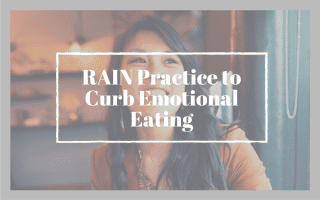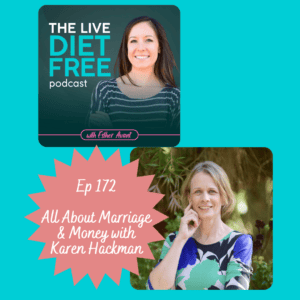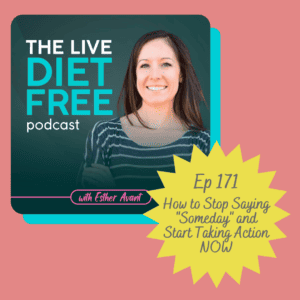I know you hear a lot about how important it is to treat yourself with compassion, to learn to trust yourself, and to want to change from a place of love rather than self-hatred but easier said than done, right?
If you’ve ever felt like you’re just not good enough or like everything in life feels hard (even if it looks okay from the outside), this episode is for you.
Today I’m joined by therapist-turned-mindfulness-and-self-love-coach, Karel Chan, whose focus is on guiding women in healing their relationships with themselves through authentic self love and compassion.
Karel has experienced body image issues, cycles of weight gain and loss, food addiction and an addiction to cigarettes.
Despite learning all about human development, self-care, wellness and psychology in her training to become a therapist, Karel still struggled in her own life. Like many of us, she reached a point where it felt like nothing in her life was working for her. Even though she had resources and support available to her and her life looked like it was working, it all felt so hard and she couldn’t truly enjoy it.
Karel is sharing with us a specific tool called the RAIN practice that will help you actually DO those things. This meditation helped her break a 20-year cycle of binging and purging and smoking cigarettes. She says it helped her feel centered and grounded so that she could continue the work of healing her inner child and her adult self.
Have you thought to yourself, “Once I lose the weight/find a healthy relationship/get promoted…then I’ll be happy,” only to reach the goal and feel pretty much the same? It’s because the accomplishment doesn’t actually change our feelings about ourselves. The actual work is internal.
Self-compassion and self-trust aren’t the prize at the end, they’re what will get you to your goals, and they’ll help you feel happier throughout the process.
Unfortunately, self-trust gets damaged over time in all sorts of ways, like setting weekly goals that we don’t hit.
We get to a place where we stop setting goals at all, because we believe we won’t follow through. Repairing that self-trust requires us to wipe the slate clean and give ourselves time to prove that things will be different.
In the Gone for Good program (and all of our coaching) we emphasize the concept of compassionate ownership, which helps our clients rebuild self-trust by consistently following through on the small (and then larger) commitments they make to themselves.
Compassion for Your Inner Child
Every part of our history is still inside of us today. Sometimes our inner child shows up in a pleasurable way, like jumping up and down and clapping your hands when you feel excited. But sometimes it shows up as immature behavior (think about when you lose your temper) that can be harmful and cause conflict.
Think about when you don’t feel like working out. Maybe your inner whiny toddler or angsty teenager comes out. In those times, you have to parent yourself – pause, figure out what’s going on and de-escalate the situation.
When you’re getting emotionally fired up, it’s usually not really about your current circumstances. It’s what you’re telling yourself they mean, and a lot of comes from old beliefs, stories or feelings we’re carrying from childhood.
If we didn’t learn how to handle difficult feelings as a child, they will continue to show up in adulthood. Karel thinks of these as unmet emotional needs. If we’re able now, as adults, to meet those needs, then that inner child can rest.
It is as simple as listening to ourselves (past or present) more deeply and asking, “What do you need right now?” It might be to feel safe or good enough. It might be to feel love or relief. It might be permission to want something, like a food you’ve believed you “shouldn’t” have.
Break the Cycle of Emotional Eating
Many of us might recognize an unpleasant thought or feeling, try to push it aside and turn instead to another coping mechanism, like emotional eating. The RAIN practice challenges us to move toward the feeling instead.
For example, feelings of frustration, stress or loneliness often lead to emotional eating. We don’t want to feel the feelings, so we seek comfort in food (or other things like shopping, cigarettes, etc.).
So, how do we break that cycle?
Karel suggests that we use the RAIN practice when we’re feeling okay. Don’t try to do it in the midst of a craving or other intense feeling. Rather, find a time when you’re feeling calmer and think back to the last craving you had.
When you have a craving, take a mini pause and ask yourself, “What is it about this feeling that I don’t want to feel?” Then, rate the strength of the craving. How much do you still want it? Can you wait another 30 seconds? Another minute? Just allowing the craving to be there will change the experience.
Use the RAIN Practice to Curb Emotional Eating
RAIN is powerful compassion and mindfulness meditation that has helped Karel personally, as well as her coaching clients, to feel more compassion for the parts of themselves that are hurting. It can be used for almost anything that’s bothering you, whether it be emotional eating, inner conflict, outer conflict, self blame, anger, or embarrassment.
If you’re a little resistant to meditation, Karel recommends thinking of it as a “practice” and reminds us that the goal is not to be empty of thoughts. It is really about awareness and observing your thoughts.
The acronym RAIN stands for recognize, allow, investigate and nurture. It invites us to look at the parts that really hurt and be with them.
Recognize something that is bothering you, whether it’s a feeling, belief or circumstance.
Allow the feeling. Rather than telling yourself that you should think or feel differently, accept that this belongs here in your experience. You don’t have to like it or keep it, just gently acknowledge that it is here now.
Investigate and get curious about the feeling. Why is it here? What beliefs might be causing this feeling? When is the first time you remember feeling this way? Look at it from all angles and try to find the core.
Nurture the part that is hurting. Ask yourself or the pain, “What do you need most right now?” It’s usually a message. For Karel, it was often something like, “I’m sorry that I haven’t taken care of you. And I’m here for you now.”
Many of us are not very familiar with hearing these kinds of messages. It might feel great, or it might feel pretty uncomfortable or untrustworthy.
And just as external wounds require attention and heal over time, you’ll have to repeat this practice to heal the internal wounds, as well. As you continue, different feelings and wounds come to the surface. It requires your continued care.
As you repeat the RAIN practice, the frequency and intensity of cravings or painful feelings is reduced (or even eliminated) over time. Can you imagine?!
As we talk about so often in coaching, you’re building a trusting relationship with yourself. It is possible to make life-altering, lasting change simply by meeting yourself in these places. It’s all within you.
Additional Resources
The Live Diet Free Podcast:
- Episode 142: How To Make Over Your Kitchen So It’s Not A Minefield
Connect with Karel Chan:
- Learn more about working with Karel at www.anchoredawakening.com
- Follow her on Instagram @anchoredawakening
- Listen to a free RAIN guided meditation




